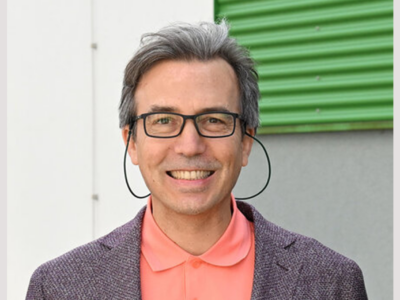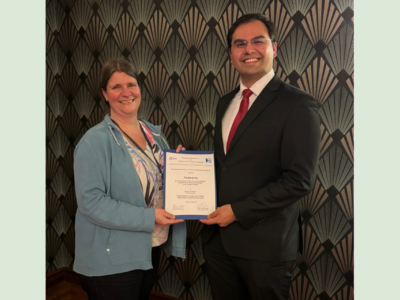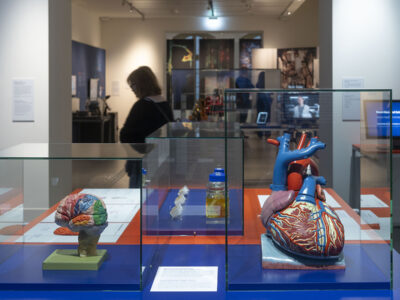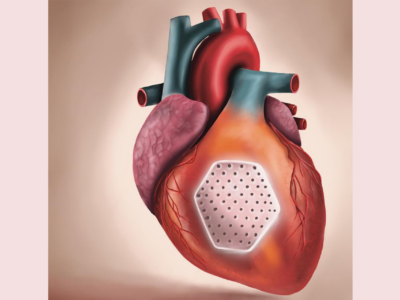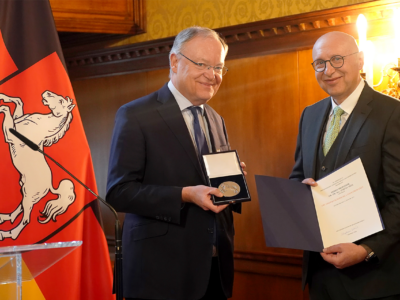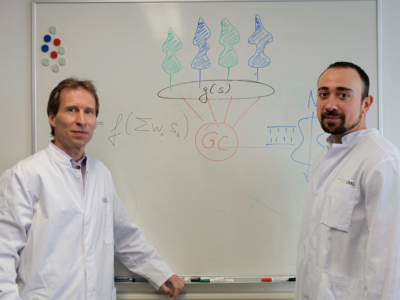25.03.2025
Public inaugural lecture by Prof. Dr. Urs Valentin Nägerl
Shadows and glimpses of light: structure and function of the interstitial space in the brain MBExC member Prof. Dr. Urs Valentin Nägerl has held the University Professorship of Anatomy and Cell Biology at the University Medical Center Göttingen (UMG) since September 1, 2024 and heads the Institute of Anatomy
24.03.2025
Shayan Hundrieser received Dissertation Award
Dr. Shayan Hundrieser, mathematician from the University of Göttingen has been honored with the prestigious Dissertation Award by the Probability and Statistics Group of the German Mathematical Society. The award acknowledges outstanding research by promising young scientists in the field of stochastics. His dissertation, entitled “Statistical Optimal Transport and its
23.03.2025
360° Tour of MBExC Heart & Brain exhibition at Göttingen Science Museum Forum Wissen
Welcome to the exhibition ‘Heart & Brain – Understanding Together’! On this virtual tour, we invite you to join us on a journey through the past special exhibition of the Göttingen Cluster of Excellence Multiscale Bioimaging (MBExC), which took place in the Göttingen Forum Wissen in 2024. With
10.03.2025
Molecular 3D structure of viral “copying machine” deciphered
Researchers at the University Medical Center Göttingen (UMG) and the Max Planck Institute (MPI) for Multidisciplinary Sciences have shown, for the first time, how the genetic material of the Nipah virus replicates in infected cells. The virus can cause fatal encephalitis in humans. Using cryo-electron microscopy, the team led by
05.03.2025
Why aged oocytes struggle to repair DNA damage
Egg cells need stamina: They are formed in a women’s body before birth and have to be on standby for decades to possibly be fertilized one day. But as they age, they accumulate more and more DNA damage. Until now, it has been unclear why the cell’s repair mechanisms do
03.03.2025
Hearing triggered by molecular “spring”
Göttingen research team gains new insights into the sense of hearing Hearing begins with the stretching of elastic molecular “springs” that open ion channels in the sensory hair cells of the ear. For decades, researchers have known that these gating springs must exist, but they could not find them.
20.02.2025
Segment Anything for Microscopy
International research team led by Göttingen University develops user-friendly software method Identifying and delineating cell structures in microscopy images is crucial for understanding the complex processes of life. This task is called “segmentation” and it enables a range of applications, such as analysing the reaction of cells to drug
29.01.2025
Study results open door to heart failure treatment with ‘heart patch’
Results from rhesus macaques provide solid ground for a first-in-human investigation of heart repair with stem cell-derived engineered heart muscle. The study is a milestone for the clinical application of the ‘heart patch’ as an innovative treatment option for patients with advanced heart failure at the University Medical Center Göttingen
16.01.2025
Stefan Hell honored with Landesmedaille of Lower Saxony
MBExC member Stefan Hell receives the highest award from the state of Lower Saxony for his many years of scientific achievements and his outstanding contribution to the research landscape in Lower Saxony. Minister President Stephan Weil presented Hell with the medal on 16 January in Hanover. Link to the
09.01.2025
Nerve cells in the eye work together to recognise contrasts and movements
Researchers at the University Medical Center Göttingen (UMG) have discovered that nerve cells in the eye often process natural visual stimuli from the environment together in cell groups and in a coordinated manner. The coordinated co-operation of nerve cells enhances signal transmission in scenes with high contrast and movement. These


